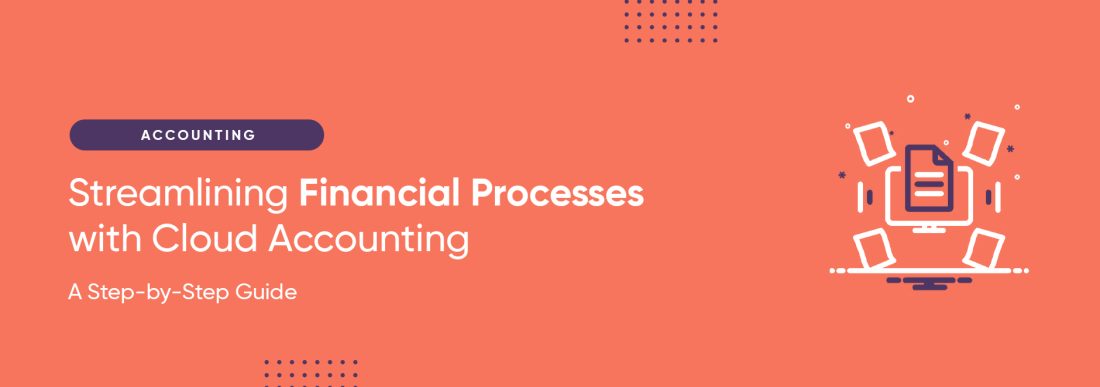Streamlining Financial Processes with Cloud Accounting: A Step-by-Step Guide
Jun 03, 2023 | 8 Min Read


Jump to Sections
Stay updated
with our Blogs
We will keep you updated about our latest blogs
Share This Blog
Assessing Your Existing Financial Processes
Assessing current financial processes is among the most essential steps in streamlining them with cloud accounting. The following should be considered:
Identifying bottlenecks in the current financial processes
Managers should begin by evaluating the existing financial processes adopted by the business such as invoicing, tracking of expenses, and financial reporting.
The next step is to identify areas where the business is encountering inefficiencies or bottlenecks. An example of this could be excessive time being spent manually entering the data into spreadsheets or generating invoices, as well as struggling to maintain accurate and up-to-date financial reports for decision-making.
Determining the areas that can be streamlined with cloud accounting:
Once the inefficiencies have been identified, businesses should evaluate which of the financial processes can be improved by implementing cloud accounting systems. Some of the processes that cloud accounting can streamline are:
- Invoicing and Payment: Cloud accounting can automate invoice generation, and payment reminders to customers and facilitate online payment options, thereby improving the cash flow cycle.
- Expense Tracking: Expenses can now be categorized allowing for careful analysis and management. Such systems can be integrated with business bank accounts and credit cards for real-time expense tracking.
- Financial Reporting: With the cloud, financial reports can be generated in real-time, allowing for valuable insights for prompt decision-making.
Setting goals and expectations for the transition:
Businesses should establish clear goals and expectations for their transition to cloud-based platforms such as increased efficiency in terms of time and resources saved for more strategic activities, accessibility of data and collaboration amongst team members, or enhanced accuracy and data security.
These assessments help in understanding the key benefits of cloud accounting, making it easier to select the system that best fits the business needs.
Choosing the Right Cloud Accounting System
The key steps and factors to consider in selecting the ideal cloud accounting system for small businesses are:
- Thorough research of the platforms available: Many blogs and forums can be found with valuable insights and reviews of the systems available. Seeking recommendations and reviews of other small businesses that have adopted cloud accounting can be helpful. Also, one should search for systems with robust security measures as well.
- Scalability: The system should be able to accommodate a potential increase in transactions, additional users, and so on, in order to avoid the need to switch platforms in the future due to business growth.
- User-friendliness and Integration: The cloud system should be compatible with the software the business currently uses or plans to implement, such as payment gateways, inventory management tools, or customer relationship management systems.
Pricing Structure: It is essential that the platform in consideration aligns with the business’ budget, carefully considering any additional charges for upgrades, maintenance, or add-ons.
Want to learn about the next steps for growing your business ?
Planning and Preparing for The Transition
This step is crucial for a successful transition to cloud accounting. Below are some details to consider during this stage:
- Creating a timeline and plan: Managers should identify and prioritize specific milestones and tasks that need to be achieved within a set realistic timeframe. Such tasks can include data migration, employee training, or system testing and configuration. Lastly, the plan should be clearly communicated amongst the employees and other decision-makers to promote transparency and to ensure that all staff are aware of their responsibilities during the transition.
- Ensuring Data Accuracy and Integrity: Before migrating data, businesses should review the data for any inconsistencies and errors. It is crucial to ensure that all existing financial data has been backed up to prevent any unforeseen events during the migration process.
- Training Employees: Comprehensive training programs should be developed, covering the features and functionalities of the cloud accounting system. User guides and video tutorials should be created for ongoing support so that employees can refer to them if they encounter any challenges.
- Integrating with Existing Systems: The cloud accounting system should also be integrated with all existing business systems for optimal efficiency. Frequent tests should be conducted to ensure data integrity, as well as quickly identify and eliminate any errors in the process.
Implementing Security and Data Protection
Prioritizing data security and privacy is crucial for the smooth transition to cloud accounting. Businesses should implement a user authentication system that ensures that only authorized individuals can access the system. This can be done by using strong passwords, biometric authentication, or multi-factor authentication.
User roles should be clearly defined with specific access levels and permissions based on job responsibilities. Businesses should practice segregation of duties to prevent individuals from complete control over the financial process, aimed at reducing fraud and/or misuse.
Regular data backups should be scheduled to prevent any loss of data. Data should be backed up in multiple secure locations such as on the cloud or off-site to overcome any unforeseen circumstances. Managers should also consider data encryption to secure sensitive financial data and deem it unreadable even if breached. The cloud accounting provider should comply with all relevant data protection regulations as well.
Monitoring and Evaluating the Results
How Accountimize Can Help Streamline Your Financial Processes
The successful transitioning of your financial process to the cloud accounting system may prove to be a tedious task. We, at Accountimize, can help you embrace the paradigm shift, leveraging cloud accounting solutions for your business to achieve financial success.
Contact us for an appointment with one of our CPAs to unlock the door for growth and success in the digital age.
Book a Discovery call


Stay updated
with our Blogs
We will keep you updated about our latest blogs



